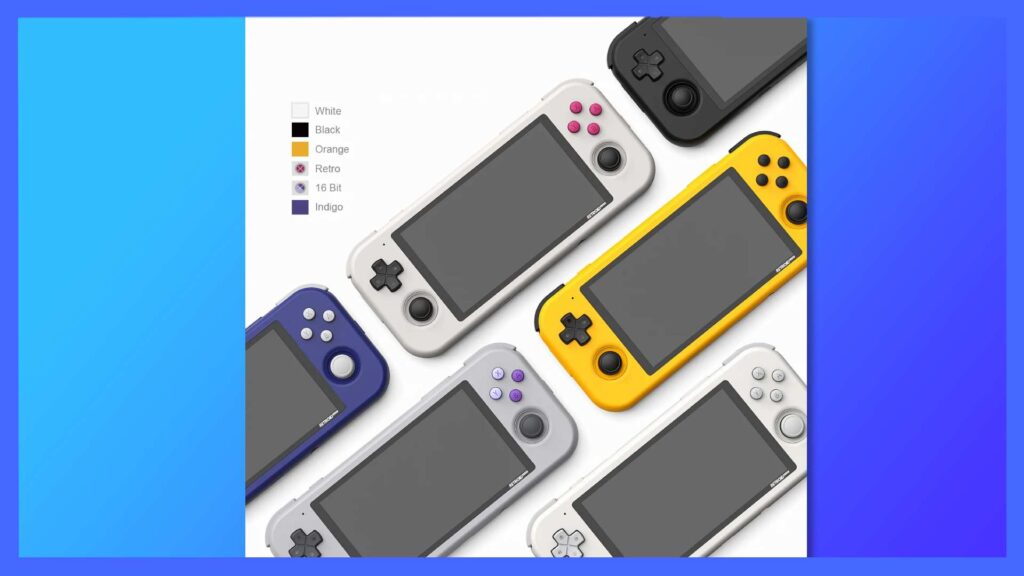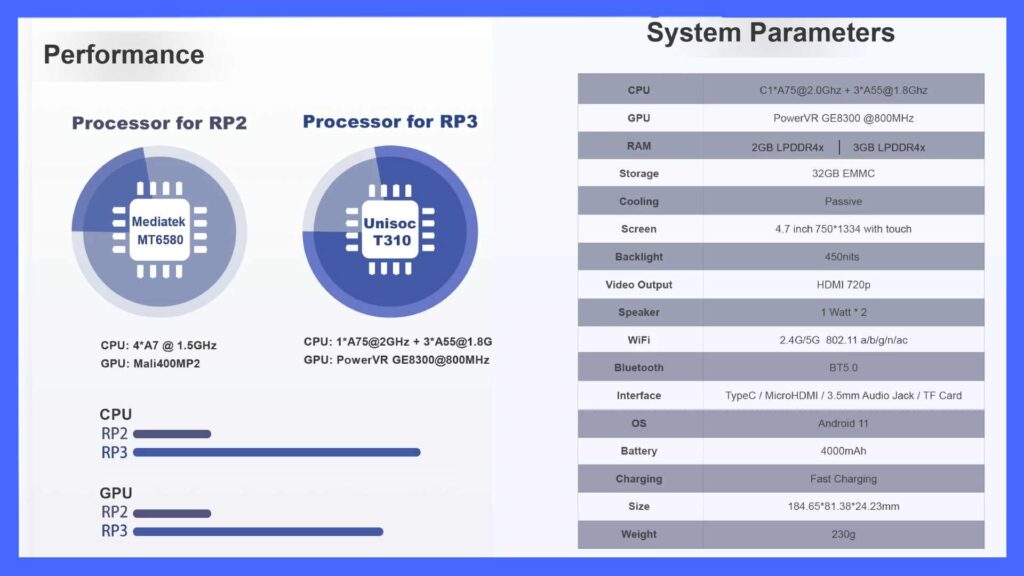At long last, Retroid has revealed the next generation of Retroid devices the Retroid Pocket 3.
The Retroid Pocket 2 horizontal handheld remains one of the most-loved consoles out there. It mixes affordability with clever engineering. Seriously, it’s a device that’s capable of just about running select GameCube games. Somehow.
It’s also a darn sight better than the RetroMini; something we’re still not over, and could launch alongside the Anbernic RG505.
If you’re looking to find out what’s new compared with the Retroid Pocket 2, the specs, and how much this beauty will cost, here’s what you need to know about the Retroid Pocket 3.
Retroid Pocket 3: What’s New

The Retroid Pocket 3 features the most up-to-date version of the game launcher along with improved directional controls and clickable L3 and R3 buttons on the analog sticks.
Other changes include an upgrade to the RAM if you choose the pricier option (from 2GB to 3GB), Android 11 replaces Android 8, and visually, resolution is bumped from 480p to 720p. Nice.
These are minor upgrades from the previously Retroid Pocket 2 but they are going to make a huge difference.
The extra RAM is important here. Tech is always a fight between the CPU and RAM; with one normally limiting what the other is capable of. To get the most out of the Retroid Pocket 3, it’s definitely worth considering the 3GB model over the 2GB. That extra juice could be the difference between something running poorly or running well.
The other thing to get excited about is the resolution upgrade. The Retroid Pocket 2’s 480p was fine for the smaller screen, but increasing the resolution to 720p and the introduction of a larger screen is really going to make the Retroid Pocket 3 shine.
Retroid Pocket 3 Specifications

As previously mentioned, this isn’t a complete rework of the console from the ground up. That said, the Retroid Pocket 2 is hugely popular thanks to its solid mid-range performance and affordability.
Do we need something as powerful as the Win600 or OhWow 1 from Retorid? Not really. Minor improvements and bumps where possible is what it’s all about.
- CPU: ARM Cortex-A75 at 2.0Ghz/ARM Cortex-A55 at 1.8Ghz
- GPU: PowerVR GE8300 at 800MHz
- RAM: 2GB/3GB
- Operating System: Android 11
- Screen: 4.7-inch touchscreen at 750 by 1334, up to 60hz
- Support 720p HDMI
- Storage: 32GB
- Battery: 4000mAh
- Wi-Fi: 2.4Ghz, 5G
- Backlight: 450 nits
- Misc: Better heat dissipation than the Retroid Pocket 2
What Can the Retroid Pocket 3 Emulate?
The Retroid Pocket 2 managed to punch well above its weight. Some GameCube games were playable, which shouldn’t even be possible.
With that in mind, we wouldn’t be surprised if the Retroid Pocket 3 manages to do the impossible again.
In terms of what we’re expecting, up to PS1 is a given. Anything worth a dime is capable of playing up to PS1, so if it can’t do that, people will riot.
It’s above PS1 where things get interesting. Dreamcast is almost certain, as is N64. Not 100 per cent compatibility, mind, but a good portion of both gaming catalogues should be playable.
There’s also the potential of Nintendo DS. 3DS may be pushing it a bit, but maybe that’s where the Retroid Pocket 3 will do the impossible again.
Retroid Pocket 3 Price and Availability
There are two models of the Retroid Pocket 3 available – one with 2GB of RAM and another with 3GB of RAM. The 2GB Retroid Pocket 3 costs $119, while the 3GB version comes in at $129.
Is that extra gigabyte of RAM worth the extra $10? In a word, yes. More RAM is always good, especially when you’re running Android.
The Retroid Pocket 3 order page is currently up, but there isn’t any mention of a release date as of yet. We’ll be sure to keep an eye on it and update you as soon as we have more info.
Important: Possible Flaws In the Device
YouTuber and industry insider Taki Udon has posted a video that will surely make potential customers think twice before buying the Retroid Pocket 3.
Udon mentions that the Retroid Pocket 3 was actually designed and built before the Retroid Pocket 2 Plus launched. Not only that, Udon says he discovered a critical issue whereby the screen would violently flicker when the brightness was below 30 percent.
“This was originally assumed to be a one-off issue,” says Udon.
“But it was a systemic problem that stemmed from someone not paying attention to the data sheet of the driver they had picked.”
Udon goes on to explain the company could fix the issue by changing the driver, but that would require the company to open up every single Retroid Pocket 3 and replace the drivers individually.
What the company did was to postpone the Rocket Pocket 3 launch and instead focus on the Retroid Pocket 2 Plus. Smart move, but Udon throws doubt on how proactive Retroid has been in that time.
In a final version of the console, Udon says the brightness slider wasn’t present at all. He was then informed it’s because he’s not on the 1.0 firmware. After updating, the brightness slider still wasn’t present. Yikes. We guess that’s one way to fix the problem at least.
The inference here is launch console may or may not suffer the screen flickering issue. Udon uses the term “launch roulette,” to describe the problem users could face.
Moving on, Udon brings up how Retroid has a tendency to remove parts without telling consumers. He cites removing the mic from the Retroid Pocket 2 and changing out the rumble motor for an inferior version.
It’s hard to say at this point how the Retroid Pocket 3 is going to fare. Our advice right now would be to hold off until more people have had the chance to test out units and dig into what’s what.

